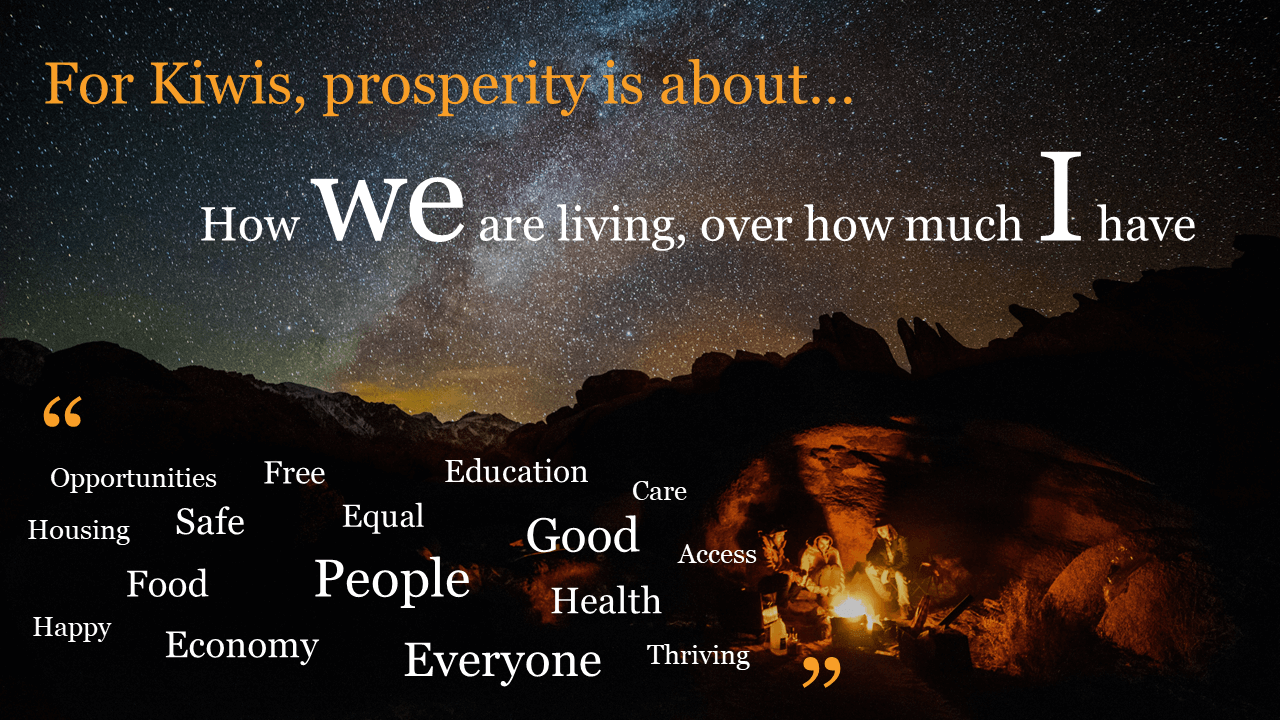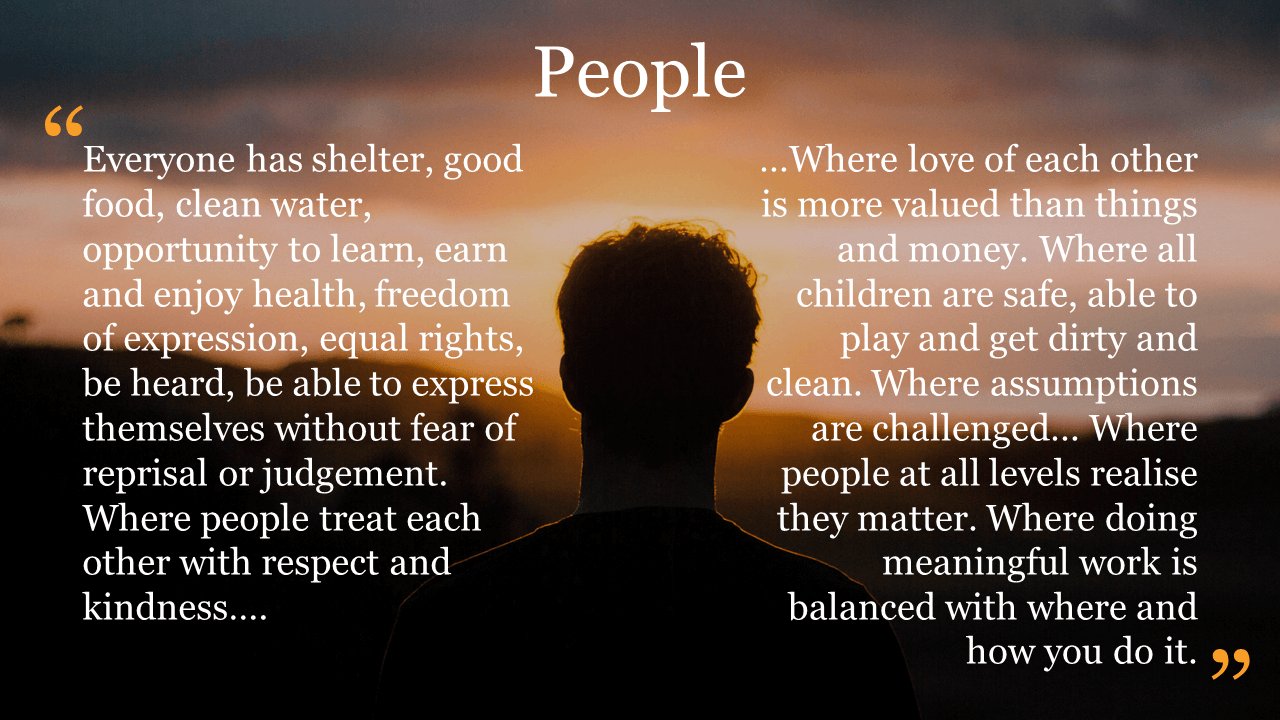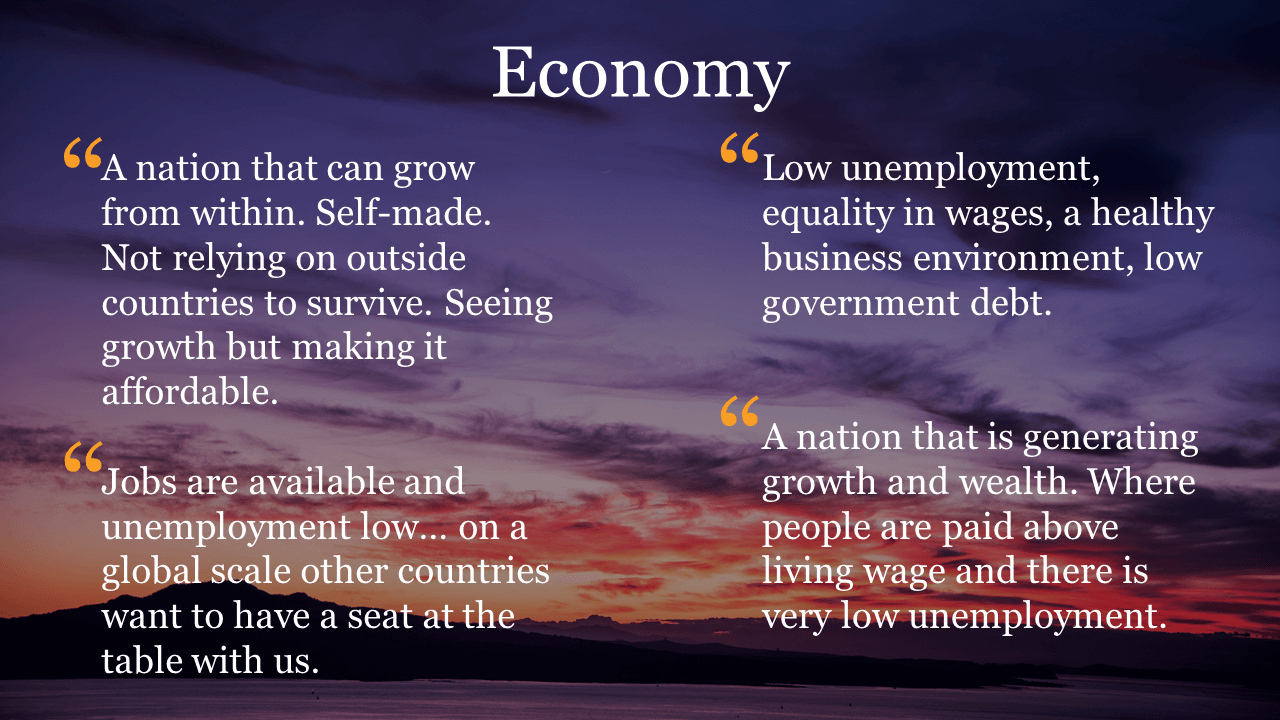23 April 2020
EventsIn the first of our new Kiwi Conversations series, we investigate what it means to be successful, to flourish and to thrive... to be prosperous.
British anthropologist John Lubbock wisely observed that "what we see depends mainly on what we look for". In this edition of Kiwi Conversations, we dive deep into New Zealanders' search for prosperity and how it shapes our core values. We also listen to the voices of the topical debate on the removal of colonial statues in New Zealand. We are a nation divided by generational values.
Exploring prosperity
1. Prosperity is rarely about possession; it's not about how much we have, but about how we live our lives. Money is a vehicle by which we are able to live a prosperous life – and to kiwis money is about having enough to live the comfortable life that’s defined by feeling well, free and part of a country where everyone can prosper; it’s less about individual success or luxury.
2. Kiwis mostly see NZ as a prosperous nation and we are confident the country is on the right track – to ensure prosperity, we believe in prioritising the economy. However, younger and older Kiwis have different notions of what is required to foster prosperity
3. The country mostly disagrees with the council on the removal of colonial statues, but views vary significantly by age. Those over the age of 35 mostly disagree with the removal, whilst those 35 and under tend to agree with it.
Prosperity in our words

The word ‘prosperity’ has a variety of definitions amongst New Zealanders, most of which focus on looking after people and ensuring everyone has a good life; a life where we have enough money for essentials and can focus on enjoyment. Money is seen as a vehicle to a prosperous life, in so much that it enables a ‘good’ life and provides opportunities; opportunities associated with employment, healthcare, and standard of living.
Prosperity to New Zealanders is living a life where they have the means to live the way they want to. A prosperous life is seen to be a good life; living without fear, the freedom and ability to play and get dirty without worry, accessibility and equality for all, freedom of expression, and happiness and contentment with life.
It is less about how much you have made and more about how we, the collective, have lived. Kiwis often refer to prosperity in regard to the collective; a good life for us all, equality and inclusion.

Importantly, New Zealanders are not just saving money to feel prosperous; they are using their money in ways that build their sense of wellbeing and ‘good life' experiences in order to feel prosperous.

Money is a means to an end
It is the vehicle to accessing life’s essentials for Kiwis, but not what we prioritise most in achieving prosperity.
In looking at what is important to achieving prosperity, it is clear that money remains important, but just enough to cover the essentials so life can be enjoyed; affording desirable or more luxury things is less important. Most of us sit between prioritising money or non-monetary aspects of prosperity. Success in our careers was seen to be the least important contributor to prosperity – a job is a way to ensure we can afford the essentials but is not a badge that defines our happiness.
Although Kiwis see prosperity as being a good life for the collective, relationships and friendships are not so important. Relationships instead could be a consequence of looking after the wellbeing of the individual; social connections and wellbeing. Living sustainably was of importance to prosperity – especially to younger Kiwis. This could also be related to contributing to wellbeing and not prioritising spending money on non-essentials.
New Zealanders aged 36 and over were significantly more likely to prioritise health and wellbeing than their younger counterparts; having built up a career and ability to pay for essentials, they now have the capacity to prioritise health and wellbeing. Those aged under 36 were more likely to prioritise their career; they need to access and afford essentials before having the ability to prioritise a good life. Once life’s essentials can be maintained, a prosperous life can be built by focusing on living a good life; health and wellbeing, happiness and enjoyment. Living sustainably is fairly important for all in Kiwis, and more so for the younger generations – underscoring and demonstrating how brands and companies help Kiwi’s live sustainable lives is universally important.
We are confident in the country’s prosperity
...which gives us a good base to create a prosperous life for ourselves.
Although individual prosperity may still be being built, as a nation NZ is seen as a prosperous place. Kiwis are also feeling somewhat confident that NZ is on the right track to becoming a prosperous nation. Even with the COVID fallout, negative news cycles, rising unemployment and threat of recession – Kiwis are still feeling pretty good about the country.
Those aged 36 and over are significantly less confident and positive. Life experience, and learning about how money can create opportunities, may contribute to a deeper understanding of prosperity and what is really important. What this shows is that NZ as a country is meeting many of the people-focused needs for prosperity: well-being, happiness and contentment, and having enough money to cover essentials.
What may be hindering our positivism and confidence is access to essentials; lacking the money to pay for life’s basics will stop us as a country from achieving a prosperous status in the minds of Kiwis. This has some serious implications: new hero brands will help a) everyday Kiwis feel prosperous by helping them get all the essentials and experiences they need (not the big ticket items), b) find a way of authentically tapping into the purposeful future-focused mindset of our young people, and c) see consumers become potentially more adverse to risk, where risk is not deemed essential nor contributing to a ‘good life'.
We recognise the importance of our economy
The economy is most important for growing New Zealand's prosperity seen to be what gives access to a prosperous life amongst all else.
Despite prosperity to Kiwis being more than just money, there is agreement by all ages that the most important thing for NZ to focus on to become a thriving, prosperous nation is our economy. By building our economy we can contribute to that monetary need for essentials, which can then provide the opportunities needed to feel we are a prosperous nation and living a prosperous life; contribute to our overall wellbeing as a nation. Other contributors noted include racial understanding and equality, government and regulations, education and care.
However, younger Kiwis (aged 35 and under) are significantly more likely to feel NZ should prioritise sustainability and the environment for generating NZs prosperity than those aged over 35; those aged over 35 are significantly more likely to want the country to prioritise governance to further NZ’s prosperity than those aged 35 and under.
It is important to recognise what is viewed as important to different consumers – ensuring the essentials and building the economy for all versus creating prosperity beyond monetary means; stabilising the foundation or remaining future-focussed?
In the news
Council removal of statues
Overall, most of the nation disagrees with the council's removal of statues associated with our colonial past. However, when it comes to age group, we are a nation divided.
Those aged 35 and younger are more likely to agree with the removal, whilst those aged 36 and over are more likely to disagree. There is a generational split over this issue within New Zealand and, as reflected in the media, this is a point of tension amongst many Kiwis. It is an argument of accepting and learning from history, or removing reminders (and celebrations) of a past we are not proud of.
But this is a point of tension to watch out for – a generational difference that may span further than this single issue. In choosing a side, you may win the favour of some but isolate others – it is important to be aware of these tensions and the division they create within our own country.
This indicates that there is a silent majority we need to be aware of. We live in times where it is important to have a view, but brands should be wary of jumping onto movements and instead take care to understand the nuanced perspectives of their customers.
We’d love to hear your questions
Be part of the One Picture Kiwi Conversations
Please email your questions to MareeL@onepicture.com. Questions are posted regularly, with findings available through Frame. We look forward to you being part of it.
Like this article?
If you'd like to hear more, subscribe to Frame or live chat to the team right here on this page.





 Tags:
Tags: